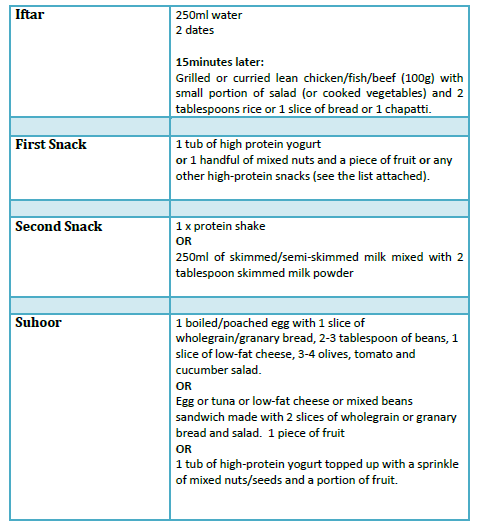Ramadan and Fasting After Bariatric Surgery
During the Holy Month of Ramadan, patients who have undergone a bariatric surgery including gastric banding, sleeve gastrectomy and gastric bypass are required to take special measures to avoid health risks.
Patients are advised to not to fast in the first 12 – 18 months after bariatric surgery to prevent malnutrition and medical complications.
Patients who have had bariatric surgery may face some challenges during Ramadan period. These challenges could include:
- Altered eating behaviours and poor nutritional intake: Following bariatric surgery, patients are usually advised to have small, frequent meals, to eat slowly, chew thoroughly, to separate eating and drinking and stop when feeling satisfied. However, fasting for long periods could lead to the desire to consume larger quantities at a faster pace upon breaking the fast. This can result in abdominal discomfort, and nausea and vomiting leading to dehydration, malnutrition and possible vitamin and mineral deficiencies.
- Dehydration: It is advised that you drink at least 1.5-2L of fluids throughout the day following bariatric surgery to keep hydrated and help prevent constipation. Following bariatric surgery it is advised that you should not drink quickly, drink large amounts in one sitting or eat and drink together. These restrictions, together with fasting (especially during long summer days) can increase the risk of dehydration.
- Dumping Syndrome: Patients who have undergone a gastric bypass / sleeve gastrectomy surgery are more at risk of experiencing dumping syndrome and/or diarrhoea, due to the restricted meal pattern during fasting and consumption of traditional foods such as sugary desserts and deep-fried foods when breaking the fast.
- Vitamin and mineral deficiencies: Following bariatric surgery, patients are recommended to take regular vitamin and minerals by their specialist dietitians that need to be spaced out appropriately throughout the day. One of the challenges during Ramadan is that the reduced stomach capacity may make it difficult to have all of the recommended vitamins and minerals in a short time frame (dusk until dawn) and space them adequately, which may result in some deficiencies.
- Hypoglycaemia: The risk of hypoglycaemia (low blood glucose level) is increased when fasting for a significant period of time (i.e. more than 10 hours). For example, the length of time between Suhoor and Iftar.
Dietary and life-style recommendations for bariatric surgery patients during Ramadan
- Break the fast by choosing water, dried fruits including dates or soup to prepare your body for the main meal, which you should try to eat after Maghreb prayer. Beginning Iftar with water will help to overcome dehydration from fasting and having 1-2 dried dates will help to raise blood glucose levels after fasting for long hours (see example meal plan below).
- Ensure the main meal is composed of protein-rich food, vegetables/salad and slowly released carbohydrates. Remember the meal balance: aim to cover half of the plate with protein, and the remaining two quarters with vegetables and carbohydrates. Always start having the protein rich foods first then, vegetables and lastly carbohydrates.
- When you're fasting for long periods of time (i.e. more than 10hours), eating Suhoor early may result in hypoglycemia before Iftar. Therefore, in those circumstances take Suhoor as late as possible.
- Avoid sleeping directly after eating as this can lead to health problems such as acid reflux, abdominal discomfort and/or regurgitation.
- Remember the golden rules: eat slowly, chew thoroughly, separate eating and drinking, stop when you feel satisfied and avoid fizzy/sugary drinks.
- Avoid foods high in fat/sugar such as traditional desserts or deep-fried meals to avoid symptoms of dumping syndrome.
- Ensure good hydration; begin Iftar with 200-250ml of water. Aim to have at least 1.5L fluids per day.
- Continue to take vitamin and mineral supplements as per recommendations.
- Continue with your routine physical activities during Ramadan; however schedule them at appropriate times. For instance; exercise 2 hours after breaking the fast, then have a snack after for post-work-out recovery.
Example Meal Plan for Ramadan

Throughout the day we advise you to keep yourself hydrated and aim to consume at least 1.5-2L of sugar free fluids.
Bari-Snack Alternatives
- Mixed nuts and dried fruit (closed handful)
- Sliced apple or celery with a tablespoon of natural peanut butter
- Two oat cakes topped with cottage cheese and black pepper
- 1 small pot of low-fat yoghurt and a portion of fruit
- 1 small pot of high protein yogurt
- Handful of carrot sticks with two tablespoons hummus
- 1-2 x Ryvita crackers topped up with oily fish e.g. pilchards/tuna/salmon flakes
- 5 x crab sticks
- 1 chicken drumstick
- 1 hard-boiled egg
- 2 x rice cakes topped up with 1 tablespoon of peanut butter
- Home-made fruit/vegetable smoothie (prepared with skimmed milk powder or protein powder)
- 1 x protein bar
- 1-2 mini babybell or cheese triangles
- 2 x slices of turkey
- Pumpkin seeds (closed handful)
- Low-fat yogurt drink
- 1 small bowl of mixed fruit salad
- 1 small bowl of salad with a matchbox size of feta cheese (add 2teaspoon of olive oil and lemon dressing)
- 250ml of skimmed/semi-skimmed milk mixed with 1-1.5tablespoon of skimmed milk powder (you can add sugar free flavourings)
Dessert alternatives: Sugar-free jelly, dried dates (no more than 3), low-fat custard and any other low-fat and low-sugar traditional dessert alternatives

